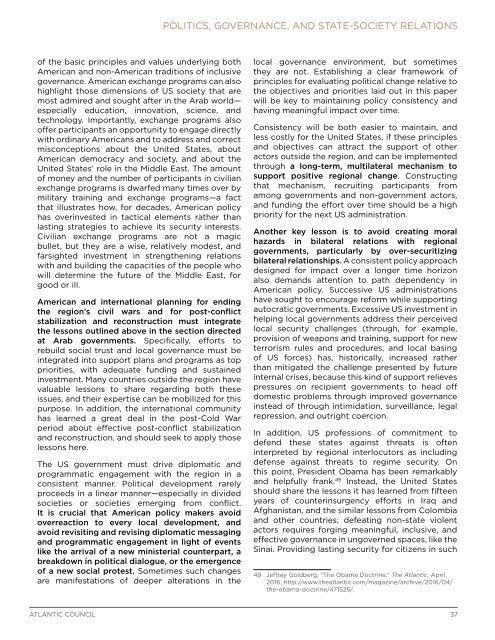POLITICS GOVERNANCE STATE-SOCIETY RELATIONS
Politics_Governance_and_State-Society_Relations_web_1121
Politics_Governance_and_State-Society_Relations_web_1121
You also want an ePaper? Increase the reach of your titles
YUMPU automatically turns print PDFs into web optimized ePapers that Google loves.
<strong>POLITICS</strong>, <strong>GOVERNANCE</strong>, AND <strong>STATE</strong>-<strong>SOCIETY</strong> <strong>RELATIONS</strong><br />
of the basic principles and values underlying both<br />
American and non-American traditions of inclusive<br />
governance. American exchange programs can also<br />
highlight those dimensions of US society that are<br />
most admired and sought after in the Arab world—<br />
especially education, innovation, science, and<br />
technology. Importantly, exchange programs also<br />
offer participants an opportunity to engage directly<br />
with ordinary Americans and to address and correct<br />
misconceptions about the United States, about<br />
American democracy and society, and about the<br />
United States’ role in the Middle East. The amount<br />
of money and the number of participants in civilian<br />
exchange programs is dwarfed many times over by<br />
military training and exchange programs—a fact<br />
that illustrates how, for decades, American policy<br />
has overinvested in tactical elements rather than<br />
lasting strategies to achieve its security interests.<br />
Civilian exchange programs are not a magic<br />
bullet, but they are a wise, relatively modest, and<br />
farsighted investment in strengthening relations<br />
with and building the capacities of the people who<br />
will determine the future of the Middle East, for<br />
good or ill.<br />
American and international planning for ending<br />
the region’s civil wars and for post-conflict<br />
stabilization and reconstruction must integrate<br />
the lessons outlined above in the section directed<br />
at Arab governments. Specifically, efforts to<br />
rebuild social trust and local governance must be<br />
integrated into support plans and programs as top<br />
priorities, with adequate funding and sustained<br />
investment. Many countries outside the region have<br />
valuable lessons to share regarding both these<br />
issues, and their expertise can be mobilized for this<br />
purpose. In addition, the international community<br />
has learned a great deal in the post-Cold War<br />
period about effective post-conflict stabilization<br />
and reconstruction, and should seek to apply those<br />
lessons here.<br />
The US government must drive diplomatic and<br />
programmatic engagement with the region in a<br />
consistent manner. Political development rarely<br />
proceeds in a linear manner—especially in divided<br />
societies or societies emerging from conflict.<br />
It is crucial that American policy makers avoid<br />
overreaction to every local development, and<br />
avoid revisiting and revising diplomatic messaging<br />
and programmatic engagement in light of events<br />
like the arrival of a new ministerial counterpart, a<br />
breakdown in political dialogue, or the emergence<br />
of a new social protest. Sometimes such changes<br />
are manifestations of deeper alterations in the<br />
local governance environment, but sometimes<br />
they are not. Establishing a clear framework of<br />
principles for evaluating political change relative to<br />
the objectives and priorities laid out in this paper<br />
will be key to maintaining policy consistency and<br />
having meaningful impact over time.<br />
Consistency will be both easier to maintain, and<br />
less costly for the United States, if these principles<br />
and objectives can attract the support of other<br />
actors outside the region, and can be implemented<br />
through a long-term, multilateral mechanism to<br />
support positive regional change. Constructing<br />
that mechanism, recruiting participants from<br />
among governments and non-government actors,<br />
and funding the effort over time should be a high<br />
priority for the next US administration.<br />
Another key lesson is to avoid creating moral<br />
hazards in bilateral relations with regional<br />
governments, particularly by over-securitizing<br />
bilateral relationships. A consistent policy approach<br />
designed for impact over a longer time horizon<br />
also demands attention to path dependency in<br />
American policy. Successive US administrations<br />
have sought to encourage reform while supporting<br />
autocratic governments. Excessive US investment in<br />
helping local governments address their perceived<br />
local security challenges (through, for example,<br />
provision of weapons and training, support for new<br />
terrorism rules and procedures, and local basing<br />
of US forces) has, historically, increased rather<br />
than mitigated the challenge presented by future<br />
internal crises, because this kind of support relieves<br />
pressures on recipient governments to head off<br />
domestic problems through improved governance<br />
instead of through intimidation, surveillance, legal<br />
repression, and outright coercion.<br />
In addition, US professions of commitment to<br />
defend these states against threats is often<br />
interpreted by regional interlocutors as including<br />
defense against threats to regime security. On<br />
this point, President Obama has been remarkably<br />
and helpfully frank. 49 Instead, the United States<br />
should share the lessons it has learned from fifteen<br />
years of counterinsurgency efforts in Iraq and<br />
Afghanistan, and the similar lessons from Colombia<br />
and other countries: defeating non-state violent<br />
actors requires forging meaningful, inclusive, and<br />
effective governance in ungoverned spaces, like the<br />
Sinai. Providing lasting security for citizens in such<br />
49 Jeffrey Goldberg, “The Obama Doctrine,” The Atlantic, April<br />
2016, http://www.theatlantic.com/magazine/archive/2016/04/<br />
the-obama-doctrine/471525/.<br />
ATLANTIC COUNCIL<br />
37



